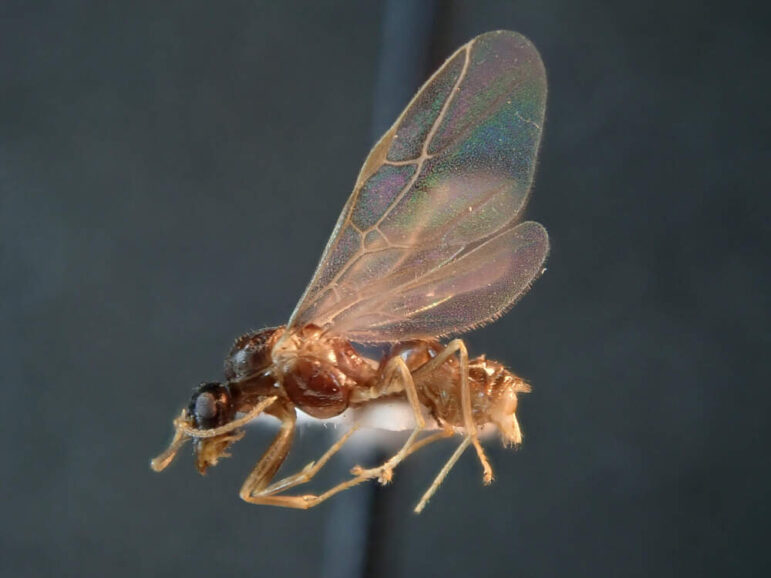Many Boston residents encountered an unwelcome sight this week: swarms of flying ants. The bugs splattered cars, flew up noses, and, in one reported case, fell into a man’s frappe outside J.P. Licks.
While that’s a terrible fate for a frappe, the flying ants are not dangerous. They’re just looking for love.
New England has about 140 species of ants according to MassWildlife, and late summer is time for some of the bugs to take their annual mating or “nuptial” flights. Lucky for you, the flights only last a day.
“The workers will push the males and the new queens out of their nest and send them off to fly, find each other and start new colonies,” said Jane Waters, a biology professor, ant expert and unabashed ant enthusiast at Providence College.
Nobody is exactly sure what triggers the swarms, which Waters called “really exciting.” But she said swarms often occur during warm weather after rain, perhaps because the ground is softer for mated queens to dig new nests.
Here’s some video Waters took of a swarm emerging in Rhode Island a few years ago. “You can see the workers running amidst the winged males and queens getting ready to fly,” she said.
Waters suspects the ants swarming Boston this week were the species Lasius neoniger. Lasius is also known as the “Labor Day ant,” because its mating flights — like many summer flings — usually happen near the bittersweet end of August.
But while summer swarms of various ants are normal for New England, it’s surprising to have so many swarms at once, over such a wide area, said Jim Fredericks, an entomologist with the National Pest Management Association. Residents reported sightings from many Greater Boston communities, including Jamaica Plain, Roslindale, Hyde Park, West Roxbury, Cambridge, Somerville, Dedham, Westwood and Norwood.
“It’s unusual to see this kind of broad emergence. Otherwise, we’d be used to it,” he pointed out. But while this week’s swarms were odd, they were not dangerous.
“Aside from being kind of gross as you walk down the street and are pelted with a rain of flying ants, they don’t really cause any harm,” Fredericks said. “They’re not going to sting. They’re not going to bite. They really have just one job to do and that’s to find a mate and found a new colony.”
A male ant will die right after mating, but the queen will hold onto his sperm for the rest of her life. Once she finds a new home, she’ll rip off her wings, burrow in and use the sperm from that one magical flight to make thousands of baby ants, for years.
And while flying ants outside an ice cream shop are merely gross, Fredericks said, flying carpenter ants or very-similar-looking flying termites inside your home may be a problem, and worth seeking a pest expert for a look.
If you missed this week’s excitement and are feeling left out, don’t worry: There are plenty of other ant species out there, and Boston may not be done with ant clouds for the summer. While another super swarm is unlikely, residents may see small groups of winged lovers emerging into the fall.
And instead of fleeing in panic, Waters suggested a different perspective. Flying ants are an opportunity to see a natural process up close, she said, a “rare part of the lifecycle of a superorganism.”
This article was originally published on WBUR.org.

